EU-Turkey relations: fire and ice
Adelina Marini, April 27, 2011
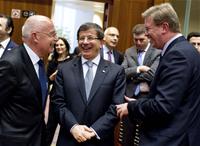 Notably cooler was the news conference after the meeting of the EU-Turkey Association Council on Tuesday (April 19th), which was held right after that of EU-Croatia. If the Croatian authorities had received significant political support through the closure of two key chapters, the EU-Turkey relations fall deeper and deeper into a marsh. Unlike the EU-Croatia Council, the meeting with media* after the EU-Turkey Council was opened by Ahmed Davutoglu, Turkish Minister of Foreign Affairs, who started with the words that he would speak in Turkish as one day this language would become an official language of the European Union.
Notably cooler was the news conference after the meeting of the EU-Turkey Association Council on Tuesday (April 19th), which was held right after that of EU-Croatia. If the Croatian authorities had received significant political support through the closure of two key chapters, the EU-Turkey relations fall deeper and deeper into a marsh. Unlike the EU-Croatia Council, the meeting with media* after the EU-Turkey Council was opened by Ahmed Davutoglu, Turkish Minister of Foreign Affairs, who started with the words that he would speak in Turkish as one day this language would become an official language of the European Union.
Responding to this, the Hungarian Foreign Minister, when his turn came, said that he had instructions from the Presidency to speak in English and not in Hungarian. This forced Davutoglu to joke that thus no one would be able to hear how much alike the Hungarian and the Turkish languages were. Although all this happened in a visibly cheerful environment, that sincerity, that was evident after the EU-Croatia Council, was lacking.
Davutoglu explicitly underlined the fact that this was the 49th EU-Turkey Council. He repeated this several times, followed then by Ankara's chief negotiator with the EU - Egemen Bagis. According to Bagis, the fact that this was the 49th meeting "signifies our deep rooted relations. But it also means that Turkey is still kept waiting".
Mr Davutoglu reaffirmed that Turkey still was determined to become a member of the European Union by emphasizing on a "full member", thus underpinning that Turkey would not accept any compromises with its membership of the sort of the French idea of a "privileged partnership". Bagis on his part said that, if according to the latest opinion polls the number of Turks that supported their country's membership to the EU (62%) was still high, almost the same number were convinced that this would never happen. Egemen Bagis said that this was a problem both for Turkey and the EU and that the approach to solving it had to be a joint one.
The time has come for more sincerity, was the message of the Turkish delegation, who reported that the country was implementing with determination all requirements of the European Union, but still was discriminated especially in terms of visa regime. At the last troika meeting in Istanbul in December, Turkey had been 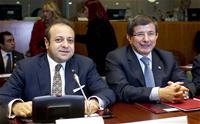 given three conditions for removing of the visa regime: introduction of biometrics in passports; completion of the work on the readmission agreement (related to the return of migrants who entered the EU via Turkey), which according to Davutoglu was ready for signature; creation of a system for integrated border management.
given three conditions for removing of the visa regime: introduction of biometrics in passports; completion of the work on the readmission agreement (related to the return of migrants who entered the EU via Turkey), which according to Davutoglu was ready for signature; creation of a system for integrated border management.
Although the largest part of the work on these three conditions to be over, Turkey still does not find a correspondent in the EU with whom to discuss the visa issue. Egemen Bagis said that this problem was of utmost importance for the Turks. "The time when Turkish people feel the least European is when they line for entry to the EU", he said and gave the example of a football player of Galatasaray who plays for a Spanish team but his wife cannot be with him as she does not get a visa.
And again the main Turkish theses sounded that all the reforms were being implemented not for the sake but in spite of the European Union, with the single aim of increasing the welfare of Turkish citizens. "So, we will continue to implement reforms in the EU way", Mr Bagis concluded.
The reaction of the EU representatives, Hungarian Foreign Minister Janos Martonyi and EU Enlargement Commissioner Stefan Fule, was reserved. Mr Martonyi underlined the necessity Turkey to work more in order to guarantee the fundamental rights and freedoms. The Hungarian diplomat restrained his statement to reporting the positive steps the Turkish government had achieved by stating that much more was needed. A little more specific was Commissioner Fule. He reported that the proposal for the beginning of a visa dialogue was already on the table. In order to remove all the obstacles between the EU and Turkey, it was necessary four conditions to be met.
The first, according to the Czech commissioner was that the political reform is the core of the accession process. He put this reform in the context of the forthcoming general elections in Turkey in June, of which the Union expected a new government to complete the constitutional reform with more vigour and, this time, with a broad civil participation. He called for fair and transparent elections. Something, to which the Turkish delegation reacted sharply by saying that Turkey had long traditions of free and fair elections. Turkish Minister of Foreign Affairs Ahmed Davutoglu even recalled that there was likely no other country where the ministers of the internal, justice and defense would resign before the elections in order to ensure that the voting will be free and fair.
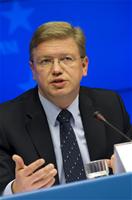 The second condition Mr Fule pointed out was freedom of the press which is of great importance for every candidate for EU membership. There must be broad debate in Turkey with pluralism of opinion. "Opposing opinions must be heard", the Commissioner added. Thirdly, the accession process needed a new impetus, the Commissioner continued. If Turkey would implement the remaining steps, the Competitiveness chapter could be opened yet during the Hungarian Presidency. For the purpose, though, Turkey has to implement fully the Additional Protocol to its Association Agreement to all EU member states, including Cyprus, as is the official formulation.
The second condition Mr Fule pointed out was freedom of the press which is of great importance for every candidate for EU membership. There must be broad debate in Turkey with pluralism of opinion. "Opposing opinions must be heard", the Commissioner added. Thirdly, the accession process needed a new impetus, the Commissioner continued. If Turkey would implement the remaining steps, the Competitiveness chapter could be opened yet during the Hungarian Presidency. For the purpose, though, Turkey has to implement fully the Additional Protocol to its Association Agreement to all EU member states, including Cyprus, as is the official formulation.
According to the Turkish Foreign Minister, Turkey has made significant offers to the European Union regarding the additional protocol but had not received a positive response. "No one can blame Turkey for not opening even one chapter in one year", he concluded.
Of 35 chapters 13 have been opened and one has been closed. Regarding chapter Competitiveness Turkey showed muscles in the beginning of the year by stating that its possible opening could create risks for its economy. In January in Budapest Egemen Bagis, Turkish Minister for European Affairs, said that the Hungarian Presidency committed to do its utmost to start negotiations on this chapter. "Our stance on this issue is obvious. Turkey wants the competition chapter to be opened. But we will not put our economy at risk just to open the competition chapter", Bagis said, quoted by the Zaman newspaper.
Currently the Turkish economy is among the fastest growing in the world. Although there is a risk of overheating, the economic indicators of the country are being assessed by economists as very good. This is why the country deems that some restrictive measures in chapter Competitiveness could hamper economic growth at a time when the Turkish economy has a lot to catch up.
It is highly unlikely this chapter to be opened during the Hungarian presidency, given the upcoming elections in Turkey in June. It is evident that the European Union prefers to focus on the technical part of the negotiations with Turkey, while Ankara thinks that there are no technical issues between the EU and Turkey. All problems are at political level. A fact which is not being denied at a member states level, which puts the European institutions in the unpleasant situation to work with their hands tied. This is why everybody is expecting to see what the outcome of the elections would be. Probably then it will become clear whether the EU-Turkey 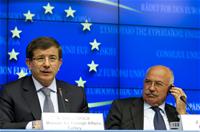 relations will continue to get deeper into moving sands or will be pulled out at a new level, which seems necessary given the changing environment in EU's neighbourhood.
relations will continue to get deeper into moving sands or will be pulled out at a new level, which seems necessary given the changing environment in EU's neighbourhood.
Whatever the outcome of the elections Turkey's and EU's conditions to continue the negotiations neutralise themselves - the EU wants Turkey to start treating the Greek part of Cyprus as any other member of the Union, while Turkey wants a removal of the visa regime and equality in the accession process as the other candidates. The EU wants one more thing too - immediate signing of the readmission agreement which is of key importance against the backdrop of growing migrant flows to the EU from the uprising in the South Mediterranean. Turkey holds this trump card and the EU holds the visa trump card, which requires a brand new approach. What will it be depends on the outcome of the June elections in Turkey.
*The news conference after the EU-Croatia Council enjoyed much bigger media interest, while after the EU-Turkey Council the journalists' questions were reduced to three for the "lack of time".
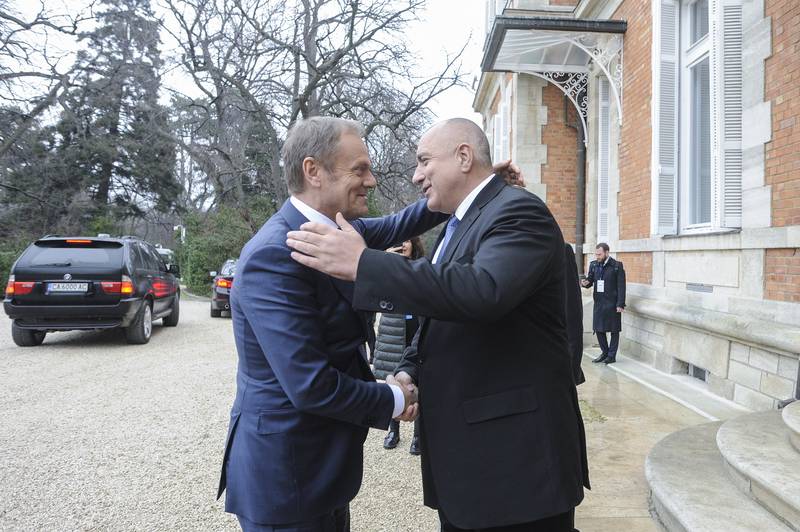 Donald Tusk, Boyko Borissov | © Council of the EU
Donald Tusk, Boyko Borissov | © Council of the EU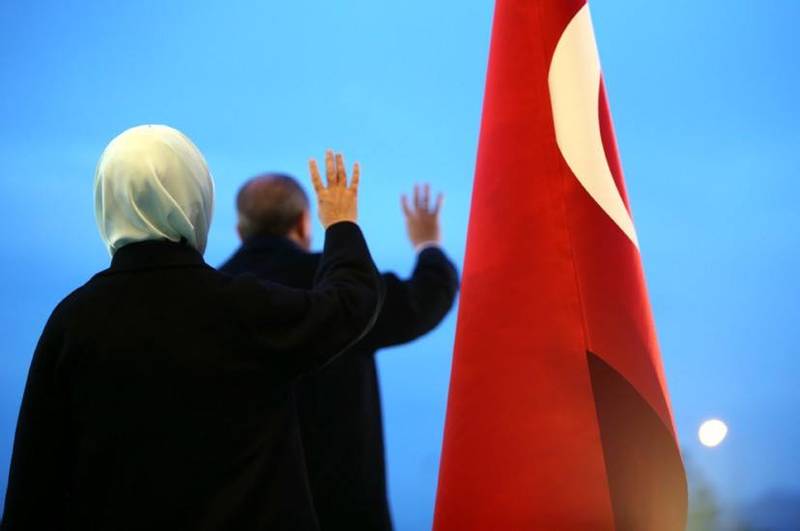 | © Turkey Presidency
| © Turkey Presidency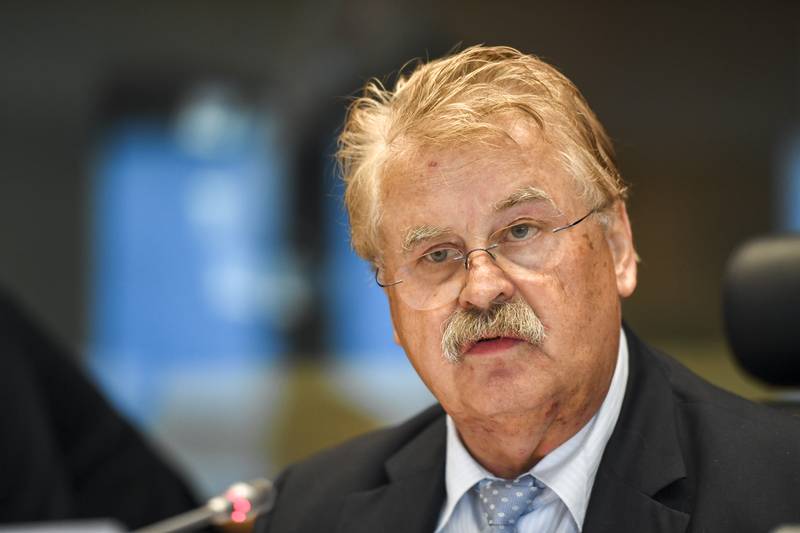 Elmar Brok | © European Parliament
Elmar Brok | © European Parliament